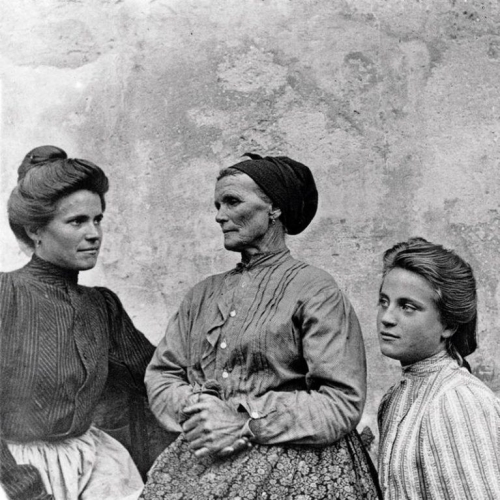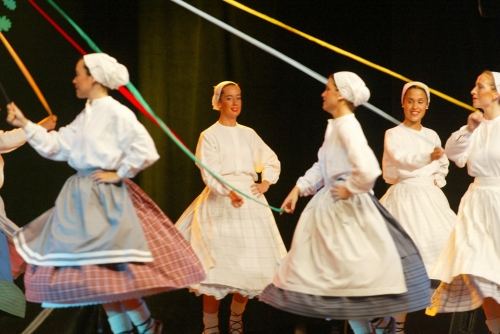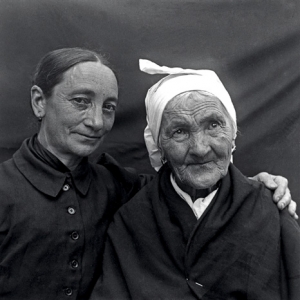Basque matriarchism?
- Andrés ORTIZ - OSÉS | Deustuako Unibertsitateko Hermeneutikako Katedraduna / Catedrático de Hermenéutica en la Universidad de Deusto / Professor of Hermeneutics, University of Deusto
- 15/ 10/ 2001
With a doctorate in philosophy from the University of Innsbruck, the writer, chair of Hermeneutics at the University of Deusto, re-examines the concept of "matriarchism", which he distinguishes from "matriarchy", in that the former refers to the mythic-symbolic substratum, and the letter is merely a hypothesis in vogue during the 19th century and used to describe certain social organizations, and the distribution or ostentation of political power.

I have been urged to write a few words on Basque matriarchism. Twenty years have past since my first incursions into this subject, which would be captured in the work "El matriarcalismo vasco" (Basque Matriarchism). That book's original title had been "A Hermenetic Approach to Basque Mythology", which described its contents perfectly, but the Deusto publishers of that time pressured me to re-baptize the work "El matriarcado vasco" (The Basque Matriarchy). However, on the first page of the work, the reader is advised that there is no (empirical) matriarchy, but a (symbolic) "martiarchism", for which reason the book finally took the latter title. I was quite aware of the controversy that this might cause, but the decision was made so that the text could have more popular impact. Indeed, it did spark controversy.
Arguments were fundamentally built up by those who confused (symbolic) Basque "matriarchalism" with an uncertain (and empirical) matriarchy, despite the fact that the book in question invalidates matriarchy, at the same time that it re-qualifies "matriarchism" as something that exists not empirically, but symbolically. But the scientific polemic only increased with politically biased views on what is basically a cultural matter. The first people to take an interest in the matter were obviously the Nationalists, but within the Nationalist Party, this presumed Basque matriarchism ended up at loggerheads with the heroic Sabinian tradition regarding Euzkadi as a masculine and pro-masculine nation, while in Herri Batasuna, the biophile stamp of Basque matriarchism contrasted with the violence of its own Basque National Liberation movement. Finally, it was Euzkadiko Ezkerra that ended up within the P.S.O.E., the group that came critically close to Basque matriarchism through mediation on behalf of M. Onaindia, but its own hirsute rationalism impeded any collaboration on such quasi "contra-cultural" subjects.
Thus, Basque matriarchism ended up floating around in Euskalerria like a double-parked ghost, and seen only by those outside the País Vasco only out of the corner of their eyes. Based on such political-cultural premises, matriarchism remains latent, although it loses its validity as legal tender, since it became seen as a child of its own inventor (yours truly). This, on the other hand, means over-valuing me as the inventor or creator of the Basque matriarcal tradition (what else could I ask, as far as my own fame is concerned?), when, in truth, I am a mere hermeneutics specialist, or interpreter of said cultural tradition, collected by José Miguel de Barandiarán, in his diverse mythological studies.
The truth is that the quintessence of Basque matriarchism is signified by the Basque matriarchal myth. That is, by the very Basque mythology whose symbols revolve around the Mother Goddess named Mari or Amari. All else is accidental and arguable, such as matters of matrilineality, matrifocality, or matricentrism, or if they have existed avuncular to a given "power of woman", etc. The one cultural feature that, as far as I am concerned, founds this so-called Basque matriarchism, is its mythology-for example, the presence of the deity Aman in Basque traditional psyche, throughout traditional mythical and religious beliefs.

However, in order to perceive the importance gained by Basque matriarchism in our traditions, we must recognize the importance of Basque mythology in general. It represents our traditional view of the world, or our "cosmovision", or symoloc concpetion of the cosmos. Within this "cosmovisional" scope, symbolism plays a decisive role, since it projects an imaginary cultural world, as a transcendental horizon of sense. It shelters our daily lives, our everyday activities, and immanence. Well then, it has undoubtedly been the oblique presence of this symbolism, an imaginary guest, which Official culture, installed in its brutish realism, empirical positivism, and formalist rationalism, has yet to be able to digest.
However, little by little, the ascent of symbolic hermeneutics becomes irresistible, parting from the Círculo Eranos and G. Durand, M. Eliade and C. Castonadis, J. Campbell and M. Gimbutas, C. Geertz and Turner, E. Drewermann and R. Panikkar.
This fact notwithstanding, it does not avoid my final auto-criticism with respect to Basque matriarchism, while pointing out its own reckless title, as well as polemical exaggerations, semantic ambiguities, and my own (very visible) limitations. Let it be said that then, its author was somewhat of a madcap youngster (the difference now being that I am no longer a youngster), writing within the context of strong, psychosocial un-repression at the end of the interminable time of Franquism. For this reason, I have tried to reconstruct the question in a more mature manner in my most recent text on the subject, La diosa madre (The Mother Goddess), but having seen the reticent reactions to it, it would seem that people are just not "up to" maturity or excessive complications. Despite all of this, many of us (not just me) think that Basque matriarchism, or better said, the Basque matriarchal myth (Basque matriarchal mythology) is sufficiently interesting to merit further study, and to be studied better it has been under the efforts of yours truly, hermeneutic or interpreter (and not inventor or creator).








